
A variety of special facilities, pathways, and courses combine to make Duke's Pediatrics Residency a unique and progressive program.
Training Sites
Duke Children's Hospital and Health Center
The major site of training is Duke Children's Hospital & Health Center, located within the Duke University Medical Center in Durham, North Carolina. Duke Children's Hospital serves as both a primary care facility and a referral center for patients from North Carolina and throughout the Southeast.
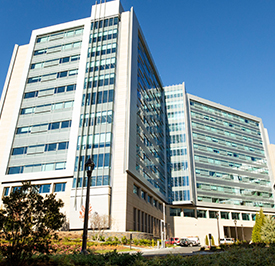
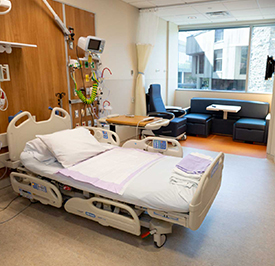
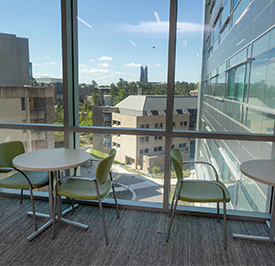

WakeMed Health and Hospitals
WakeMed Raleigh provides a fantastic community hospital experience for Duke residents where they work on integrated teams with the UNC residents to care for patients in the inpatient, outpatient and ED setting. WakeMed Children’s offers 25 inpatient rooms, 12 observation rooms, and eight pediatric ICU beds. Residents are under the supervision of superb hospitalists and intensivists in caring for the children of Wake County and serving as a referral center for the surrounding counties.
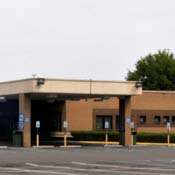
Lincoln Community Health Center
Lincoln Community Health Center (LCHC) is located in downtown Durham near North Carolina Central University. A federally qualified health center providing comprehensive care for Durham’s medically underserved community. LCHC offers a range of health care services, including medical, surgical, nutritional, dental, social, mental health, family care nursing, OB-GYN, and “Teen Clinics.” The Pediatric Clinic at Lincoln is a primary care pediatrics facility. Upper level residents serve an essential role in the clinic at Lincoln, operating independently with support from attending pediatricians.
Pathways
Duke Pediatric Research Scholars Program for Physician-Scientist Development
The Duke Pediatric Research Scholars Program (DPRS) is a Physician-Scientist Training Program (PSTP) dedicated to preparing burgeoning physician-scientists for careers in academic medicine. DPRS combines the intensive clinical training environment of Duke Children’s with the rigorous scientific training of the world-renowned laboratories at Duke University.
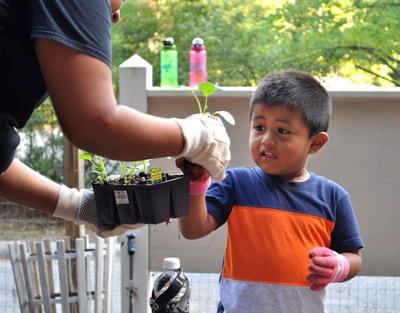
The advocacy and community pediatrics outreach rotation is designed to enhance resident education by providing pediatrics residents with exposure to a wide variety of community health education, home needs assessment, and pediatric advocacy experiences that are specifically targeted toward the urban underserved population residing in Durham County. Residents accompany community health workers on home visits for high-risk patients, teach health classes to local at-risk preschool, elementary and high school children and participate in visits to the North Carolina General Assembly when in session. In addition, residents participate in a variety of self-paced modules covering poverty, oral health, motivational interviewing and advocacy topics.
Some of the specific experiences include:
- Reach Out and Read
Reach Out and Read is a nonprofit organization that gives young children a foundation for success by incorporating books into pediatric care and encouraging families to read aloud together. Our faculty and resident leaders are involved in maintaining this program in our clinic sites. All residents are involved in promoting the Reach Out and Read message to the patients they care for in their clinics. - Healthy Lifestyles and Bull City Fit
During their community and advocacy rotation, residents are engaged in the Healthy Lifestyles Program, a multidisciplinary clinic for overweight patients, and Bull City Fit, a partnership created through a joint use agreement with Durham Parks and Recreation to provide a free wellness program for these patients and their families. Because it is difficult to effectively teach the principles of building and sustaining community relationships within the constraints of a one month rotation, Bull City Fit is used as a model for the residents as they maintain oversight during their month and are involved in everything from volunteering with the children’s exercise classes to program planning and development. - Resident Outreach in Community Obesity Prevention (ROCOP)
The Resident Outreach in Community Obesity Prevention (ROCOP) project aims to educate the at-risk preschool population of Durham about healthy nutrition and physical activity. The aim of the program is to increase education in the early childhood setting to prevent the onset of childhood obesity. The preschool age group was specifically chosen based on data from Durham’s Partnership for Children, which indicates children between the ages of two to five have an increased incidence of not receiving well child care. As a result, by the time they return for kindergarten physicals, many are already overweight. Building on the principles of advocacy and utilizing family-centered communications techniques, residents conduct outreach work to impact this target population. Specifically, the residents focus their outreach efforts on the North Carolina Division of Public Health's "Eat Smart, Move More" message of "5-3-2-1-almost none," a child-friendly and evidence-based teaching tool that highlights healthy eating and exercise. - Carolinas Collaborative: Community-Pediatric Partnerships for Promotion of Child Health and Prevention of Toxic Stress
With the guidance and support of the American Academy of Pediatrics’ Community Pediatrics Training Initiative and recent funding from the Duke Endowment, the Duke Pediatrics Residency program is actively involved in creating the Carolinas Collaborative--a North and South Carolina residency advocacy collaborative that will support 8 pediatric residency programs. All of the programs will be involved with advancing community-based interventions that aim to ameliorate the effects of toxic stress in their communities. The Duke community partnership project will be with Durham Connects. - LEAP
Believing in the potential of all children, the Latino Educational Achievement Partnership (LEAP) empowers Latino and other children in Durham to achieve academic success by providing a high-quality preschool and on-going support through middle school. - Durham Connects
Durham Connects increases child well-being by bridging the gap between new parent needs and community resources. A collaborative effort among the Duke Center for Child & Family Health, Duke Center for Child and Family Policy, Department of Social Services, and Durham County Health Department, Durham Connects hires and trains nurses to provide in-home health assessments of mothers and newborns, as well as discuss the social conditions affecting the new family. Nurses make a first visit when the baby is about three weeks old, with the goal of connecting new parents with the community resources they need to raise a healthy child. Through the community pediatrics and advocacy rotation and with recent funding from the Duke Endowment, the Duke Pediatrics Residency program is embarking on a new collaboration with the Durham Connects group. - Ronald McDonald House
The Ronald McDonald House of Durham & Wake offers a comforting home away from home and a community of support for seriously ill children and their families. Residents have the opportunity to interact with and support patient families in an informal environment while their children are receiving medical treatment at Duke.
Residents work with the physicians and social workers to assess suspected victims of child abuse and neglect. The residents observe interviews with patients and families, participate in the physical examination, and attend conferences and legal proceedings, when appropriate. Most residents will spend two to four weeks in this rotation.
Evidence-Based Clinical Practice is woven into multiple facets of resident education in order to emphasize it as a method of continuous learning, rather than an isolated set of skills. There are specific EBCP journal clubs held throughout the year. During these sessions, a pair of senior residents leads the group through discussion of a relevant journal article while also choosing a specific EBCP concept to emphasize in a brief didactic during the session. A faculty expert joins the group to assist with formulation of article analysis and teaching of the EBCP concepts.
These EBCP core concepts are then applied throughout residency training. Senior residents on the wards are encouraged to identify a clinical question for admitted patients. They then use the medical literature to answer their questions in a senior note and share this information on work rounds.
The Duke Pediatrics Residency training program is committed to providing opportunities to allow our trainees to become globally experienced, socially responsible, service-oriented citizens so that they may make a lifelong commitment toward reducing the burden of disease and health inequalities. Our current programs support residents for short-term global health electives for two months. This immersion experience allows our residents to experience clinical care and occasionally research projects in other countries. Opportunities exist in many sites where Duke has long-term commitments including Central and South America, sub-Saharan Africa, Southeast Asia, and Australia.
This is a one-month elective where residents develop a deeper understanding of the major themes in the history of American Pediatrics. A general pediatrician with a doctorate in history mentors residents as they conduct a literature search to explore the historical background of a particular area of interest.
Compassionate Care Conference (3C) is an interdisciplinary dialogue focused on exploring the experience of being healthcare providers in unique, challenging, and powerful situations. Through shared stories and conversation, these rounds aim to strengthen our ability to be compassionate, resilient healers and teammates as we deliver transformative care to our patients. Our conference occur on the 3rd Wednesday of the month.
All second-year Pediatrics residents and third-year Medicine-Pediatrics residents participate in a longitudinal leadership curriculum designed to prepare them to lead clinical teams. Participants are provided coverage for clinical responsibilities so they can attend 6 monthly 2-hour sessions, which combine didactic content with small-group case discussion and role play. Peer coaching occurs between sessions. Topics covered include Leadership Styles and Personality Types, Emotional Intelligence and Resilience, Communication and Team Management, Conflict Management, Negotiation, and Influence/Persuasion.
The Pathway to Pediatrics Liaisons are a team of residents who are passionate about medical education and mentorship. The P2P liaisons work with the Pediatric UME faculty and the student-run Pediatrics Interest Group to engage medical students in pediatrics-related careers. Activities include: performing mock residency interviews, leading the resident-student mentorship program, and participating in the annual Peds Meet and Greet and Residency Application Panel.
PRSC is a resident-led council supported by faculty and chief residents with a goal of being recognized as leaders in patient safety and fostering a culture of safety across the residency program. The council works to educate and engage fellow residents on quality improvement, process improvement, and patient safety. The PRSC organizes monthly morbidity and mortality conferences and reviews safety reports. More than 30 action items have been completed by the PRSC since its establishment in 2013. Council members have presented posters at multiple local, regional, and national conferences and have received recognition for their work. The PRSC provides a model for patient safety across graduate medical education at Duke.
The Resident Wellness Committee is dedicated to promoting the well-being of residents by creating opportunities for connection, relaxation, and support. The committee plans and organizes events both within the hospital and in the community, fostering a strong, positive program culture. These activities provide residents with valuable time to decompress, recharge, and build relationships with one another outside the pressures of clinical work. By encouraging camaraderie and balance, the Wellness Committee plays a vital role in sustaining a healthy, engaged, and resilient residency community.
Advising and Mentoring
Upon entering the program, all Duke Pediatric residents are assigned an advisor from within the program leadership team. Program advisors meet with residents at least twice a year to review their progress, provide feedback, create an individualized curriculum, and assist with optimizing their educational endeavors at Duke. Residents and advisors establish relationships that continue over all three years of their training.
All residents are also assigned a career mentor, who is selected to meet the individual needs of each resident, as identified by the resident and their advisor. The mentor provides general career counseling in a given subspecialty and may facilitate participation in a research or quality improvement project. Residents may have more than one mentor, depending on their evolving career decisions and mentoring needs.
Teaching Opportunities
Training physicians who can share their skills with other learners is an important part of our education at Duke Pediatrics. There are many opportunities for learning these skills throughout residency.
Teaching and Feedback Workshops
- Rising second years participate in a workshop on setting personal goals for teaching, applying basic adult learning principles, practicing the five Microskills of Clinical Teaching, learning bedside teaching strategies, practicing effective feedback, and identifying team leadership skills.
- Rising third years participate in a workshop on understanding the learning needs of students and interns, identifying strategies to incorporate more teaching into clinical practice, and practicing effective feedback.
Resident as Teacher Elective
- Second and third year residents can choose this two week elective.
- Residents are given a structured and individualized curriculum to augment their teaching skills in various clinical settings.